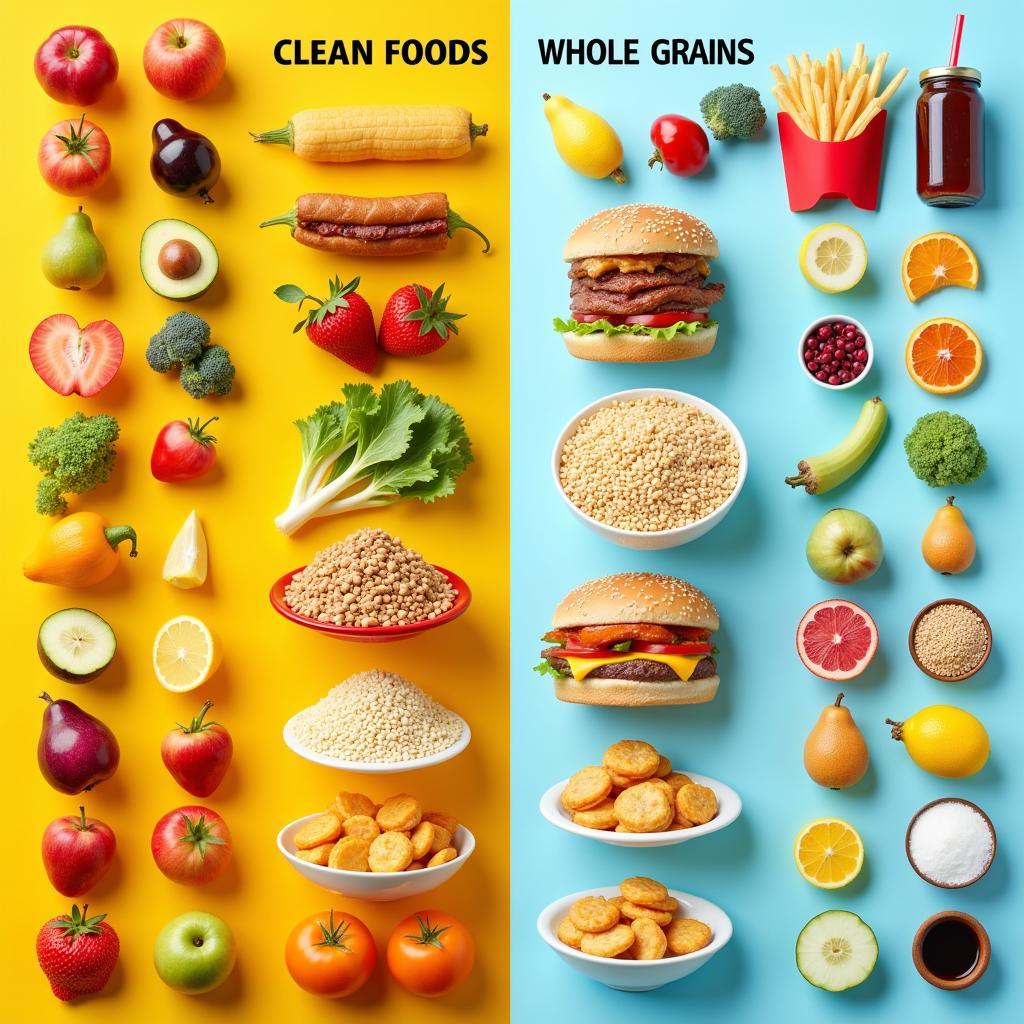Clean And Unclean Food. It’s a topic that dominates dinner conversations, online forums, and even doctor’s offices. But what does it really mean? The terms often carry different connotations for different people, leading to confusion and sometimes even judgment surrounding dietary choices. This article aims to unpack the various interpretations of “clean” and “unclean” food, explore the cultural and religious influences behind these classifications, and ultimately empower you to make informed decisions about what you eat.
Decoding “Clean” and “Unclean” Food
The idea of clean eating usually centers around consuming whole, unprocessed foods, often minimizing or eliminating added sugars, unhealthy fats, and artificial ingredients. Think fresh fruits and vegetables, lean proteins, and whole grains. Unclean foods, conversely, are often perceived as processed foods, fast food, sugary drinks, and anything with a long list of ingredients you can’t pronounce.
However, it’s important to acknowledge that “clean eating” can sometimes veer into restrictive and unhealthy territory. Obsessively labeling foods as “good” or “bad” can lead to disordered eating patterns and unnecessary anxiety around food. The key is to find a balance, enjoying a variety of foods while prioritizing nutrient-rich options.
Cultural and Religious Perspectives
The concept of clean and unclean food is deeply rooted in many cultures and religions. Jewish dietary laws, known as kashrut, outline specific guidelines for permissible and forbidden foods. Similarly, Islamic Halal dietary laws dictate which foods are considered lawful and which are Haram, or forbidden. These guidelines often go beyond simply processing and encompass animal slaughter methods, the mixing of certain ingredients, and even the source of the food itself.
In some cultures, the classification of clean and unclean food stems from traditional beliefs about health and wellness. Certain foods might be considered “heating” or “cooling” for the body and are consumed accordingly based on the season or an individual’s perceived needs. Understanding these cultural nuances is crucial to appreciating the diverse perspectives surrounding food choices.
 Clean vs. Unclean Food Comparison Chart
Clean vs. Unclean Food Comparison Chart
Navigating Modern Dietary Trends
In the age of social media and wellness influencers, the concept of clean eating has taken on a new life, often focusing on aesthetic appeal and restrictive diets. This can lead to harmful trends that prioritize appearance over health and wellbeing. It’s important to remember that there is no one-size-fits-all approach to healthy eating.
What works for one person might not work for another. Listening to your body, understanding your individual nutritional needs, and seeking guidance from qualified professionals like registered dietitians are crucial steps in developing a sustainable and healthy relationship with food.
Is “Clean Eating” Always Healthy?
While the principles of clean eating can be beneficial, taking it to the extreme can be detrimental. Cutting out entire food groups, demonizing certain ingredients, and obsessing over food labels can lead to nutrient deficiencies, disordered eating, and an unhealthy relationship with food. Remember, food should be enjoyed and celebrated, not feared.
The Importance of a Balanced Approach
Ultimately, the best approach to nutrition is one that emphasizes balance, variety, and moderation. Incorporating a range of nutrient-rich foods from all food groups, while allowing yourself occasional indulgences, is a much more sustainable and healthy approach than rigidly adhering to strict “clean eating” rules. Focus on nourishing your body with wholesome foods and enjoying the pleasure of eating without guilt or restriction.
“A balanced diet is not about restriction, it’s about choosing foods that nourish your body and mind,” says Dr. Emily Carter, a registered dietitian and nutritionist. “Focus on whole, unprocessed foods, but don’t be afraid to enjoy treats in moderation. It’s all about finding what works for you.”
What about Cheat Meals?
“Cheat meals” can have a place in a balanced diet. Allowing yourself occasional indulgences can help prevent feelings of deprivation and make it easier to stick to your overall healthy eating habits. However, the key is moderation.
 Example of a Cheat Meal
Example of a Cheat Meal
Conclusion
Understanding the various interpretations of clean and unclean food is essential for navigating the complex world of nutrition. While prioritizing whole, unprocessed foods is generally recommended, it’s important to avoid extreme or restrictive diets. A balanced approach that incorporates a variety of nutrient-rich foods, allows for occasional indulgences, and prioritizes mental and physical wellbeing is the key to a healthy relationship with food and a balanced lifestyle. Remember, clean and unclean food are subjective terms and focusing on a balanced diet is crucial for overall health and well-being.
FAQ
-
What are some examples of clean foods?
- Fruits, vegetables, whole grains, lean proteins, and unprocessed foods are generally considered clean.
-
Is clean eating the same as healthy eating?
- Not necessarily. While clean eating principles can contribute to a healthy diet, extreme or restrictive clean eating can be unhealthy.
-
Are cheat meals allowed in a clean eating plan?
- Occasionally indulging in cheat meals can be part of a balanced approach, preventing feelings of deprivation.
-
How can I make clean eating more sustainable?
- Focus on making gradual changes, finding healthy swaps for your favorite foods, and listening to your body’s needs.
-
What are some cultural or religious perspectives on clean and unclean food?
- Many cultures and religions have specific dietary laws and traditions that define clean and unclean foods, such as kashrut in Judaism and Halal in Islam.
-
How can I avoid unhealthy clean eating trends?
- Seek guidance from registered dietitians, prioritize whole foods over restrictive diets, and focus on overall health and wellbeing over aesthetics.
-
Is it necessary to label foods as “clean” or “unclean”?
- No, labeling foods can create an unhealthy relationship with food. Focus on balanced nutrition and enjoying a variety of foods.
When you need support, please contact Phone Number: 02437655121, Email: minacones@gmail.com Or visit: 3PGH+8R9, ĐT70A, thôn Trung, Bắc Từ Liêm, Hà Nội, Việt Nam. We have a 24/7 customer service team.